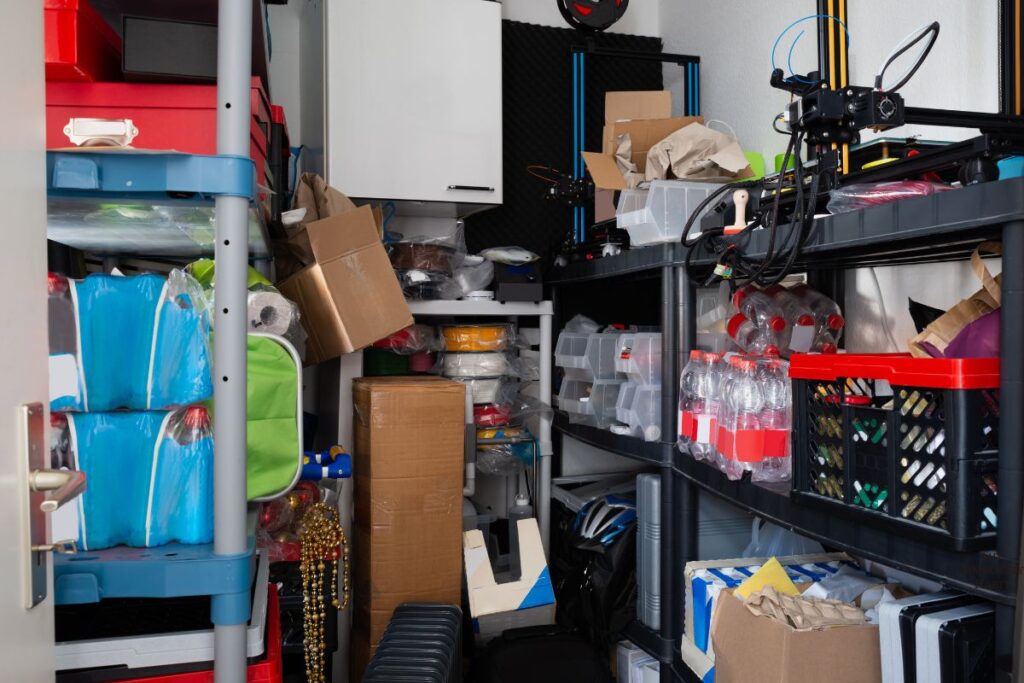
As many of us pursue a simpler, more organized life, decluttering is a key step to achieving our goals. But for many people, the process of letting go of possessions and creating space can be unexpectedly challenging. This difficulty often stems from what psychologists refer to as a ‘scarcity mindset’—a pervasive belief that resources, opportunities, and even personal worth are limited.
This mindset can contribute to clutter in a big way – and create a barrier to some who try to embrace a simpler lifestyle. Not sure if you’re struggling with a scarcity mindset – or how to overcome the challenge? Keep reading to see how this mindset hinders the decluttering process and learn some tips to overcome it.
What causes a scarcity mindset?

When you’re dealing with a scarcity mindset, you experience a lot of stress, anxiety, and fear about not having enough in the future – but the source of the problem is often rooted in the past. Scarcity mindsets can take hold for a number of reasons, but in many cases, it’s the result of a loss, trauma, or going through a period of time when you felt as though you didn’t have enough.
It might be caused by losing a job, a home, or a relationship. Many who grow up in poverty are left with a scarcity mindset, even after they’ve achieved financial security and stability. Similar to grandparents who grew up during the Great Depression, for those who experienced a lack it can become more challenging to learn to let go. If you fear that things cannot be replaced or that you may not have the resources you need, it creates a great deal of anxiety and stress.
How can a scarcity mindset keep you from decluttering?
Not only can a scarcity mindset contribute to clutter, but it can also cripple you in the process of trying to fix the problem.
Decluttering isn’t an easy task for anyone – but when you add in the complexities a scarcity mindset can bring, it makes it even more challenging.
Here are just a few ways a scarcity mindset can keep you from decluttering:
1. You see decluttering as wasting money.

When you’re struggling with a scarcity mindset, thoughts about not having enough aren’t strictly limited to physical possessions. You may feel the same about money. You can’t have enough of it to feel truly secure, and you can’t stand the thought of throwing away your hard-earned cash.
At that point, you don’t see clutter for what it is – stuff that’s taking up space and adding no value to your life. Instead, you view it through the context of the money you spent on it. One of the reasons people hold onto clutter is because they feel like they’re throwing away money, which can cause additional feelings of guilt and regret. The good news is there are frugal ways to declutter that can help you save money while letting go of the extra things you don’t need.
2. You hold onto things “just in case.”

Another hallmark of the scarcity mindset is wanting to keep things around with the justification of “just in case.” You hold onto old cords and cables, books you’ll never read again, electronics you’ve upgraded a long time ago on the off chance something will happen and they’ll be of use again. In reality, the chances you actually need those things are low – and you could always replace them if the need did arise. But when you’re stuck in a scarcity mindset, that isn’t a guarantee.
A scarcity mindset can also feed into your fears about the future and the potential of various possibilities. You may fear that you’ll regret letting go of these items that could be useful in some scenarios. However, that thinking doesn’t consider how all those things you’re desperately holding onto now are impacting you in the present. Keeping excessive items carries daily stress and burdens with them and that is guaranteed.
3. You develop irrational emotional attachments to physical possessions.

When living with a scarcity mindset, your possessions aren’t just things. They can become your security blanket and items that may not even be useful can give you a false sense of preparedness. It’s also possible for them to become symbols of your success, reminders of significant events, or tokens of affection from those you love. They represent your self-worth and offer a sense of belonging.
And when your emotions and identity begin to intertwine with your stuff, the thought of getting rid of it becomes even harder – making the act of decluttering nearly impossible. This is when it’s important to remember that you are not your stuff. No one is. Your value is far more than any tangible item and you deserve to be free of the burdens that are weighing you down.
4. You keep adding to the stuff in your home, increasing your clutter.

When you have a scarcity mindset, one strategy for coping and mitigating stress involves acquiring as much as possible – forever expanding the assortment of stuff in your home. With possessions accumulating faster than you can get rid of them, clutter continues to grow and expand, presenting even more of a problem.
Check to see if you’re experiencing some of the signs that you have too much stuff. Often the goal with holding onto things is imagining that you’ll want them at some point, but if your home is overstuffed it’s unlikely you’d be able to easily locate them anyway. Additionally storing extra stuff on the very small chance you might use it keeps someone else from being able to enjoy it now. It can also leave an unnecessary burden on your spouse or children to have to sort through later.
How can you overcome a scarcity mindset and declutter your home?
A scarcity mindset can certainly present a challenge, but it isn’t insurmountable.
By acting with intention and taking meaningful steps to mitigate the problem, you can shift away from feelings of scarcity. And, in the process, make your home more manageable.
1. Shift your mindset to one of abundance.

The opposite of a scarcity mindset is an abundance mindset. While it might be hard to see the world through a drastically different lens, it is possible. It just takes a little bit of intentional effort. By focusing on gratitude for the things you do have, and realizing that you have everything you need (and more), you can begin to let go of limiting beliefs and shake off that scarcity mindset.
You can then shift your thinking to get into a decluttering mindset as you let go of the excess stuff.
2. Take it one step at a time.

You won’t be decluttering your whole house in a weekend with a scarcity mindset – and that’s okay. For 1 in 3 people, it takes a week or longer to complete a decluttering project. And that’s ok. After all, it took a while to accumulate the clutter and it’s a process to work through letting it go. Using the slow declutter method is preferred by the vast majority of people anyway. It creates less stress and makes the decluttering process feel more doable.
Focus on breaking the task up into manageable segments. That might mean starting as small as getting rid of a single item each day. Another option is tackling a very defined area of your home – such as a drawer or shelf. Start with a couple of these 10-minute decluttering tasks that will have big results in your home. This will help jumpstart the process so that you can begin making progress right away.
3. Set goals – and stay focused on them.
Before you begin, understand what you want to achieve. Define your decluttering goals – and put some real thought into them.
Think about the why – the driving force behind your actions.
Do you want to be able to invite friends and family over and feel proud to show them around your space? Or do you want to be able to relax in the evenings in a clean, relaxing environment? Maybe you just want to be able to find all the stuff that you’ve lost among the clutter in your house. Or perhaps you don’t want to leave all the things you’ve been keeping for your kids to have to deal with later.
Whatever your reasons, set realistic goals for your home, and once you’re clear on what they are, write them down. Put them in a visible place that you can revisit as often as you need to. Make them the background of your phone, or write them on sticky notes and put them on your fridge.
Reminding yourself of the desired end result will help keep you motivated and make you less likely to give into a scarcity mindset.
Sources:
- All photos used in this blogpost are sourced from the internet, and the rights belong to their respective owners
- Poplin, J. (2024, October 25). 4 Hidden Dangers of a ‘Scarcity Mindset’ That Keep You From Decluttering. The Simplicity Habit. https://www.thesimplicityhabit.com/scarcity-mindset-keeps-you-from-decluttering/


